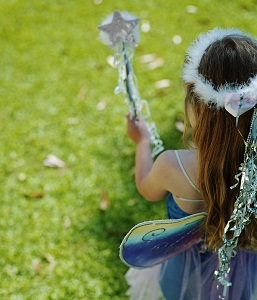Magical Thinking
 Magical thinking is the belief that one’s own thoughts, wishes, or desires can influence the external world. It is common in very young children. A four-year-old child, for example, might believe that after wishing for a pony, one will appear at his or her house. Magical thinking is also colloquially used to refer more broadly to mystical, magical thoughts, such as the belief in Santa Claus, supernatural entities, and miraculous occurrences.
Magical thinking is the belief that one’s own thoughts, wishes, or desires can influence the external world. It is common in very young children. A four-year-old child, for example, might believe that after wishing for a pony, one will appear at his or her house. Magical thinking is also colloquially used to refer more broadly to mystical, magical thoughts, such as the belief in Santa Claus, supernatural entities, and miraculous occurrences.
Magical Thinking and Child Development
Toddlers and preschoolers often engage in pretend play. This allows them to test out new identities, to develop theories about the ways other people think, and to practice social skills. Magical thinking tends to coincide with this pretend play, and young children often have fantastical beliefs about what can and cannot happen. Magical thinking tends to fade as children begin to master concepts of logic and cause and effect. Older children may periodically deviate into magical thinking, but reality-based thinking dominates. In adults, magical thinking can be a sign of a mental health condition. However, some cultures encourage magical thinking about certain things. For example, a tribal religion might encourage members to believe that carrying around a fetish will cause it to rain. This sort of magical thinking is not symptomatic of mental illness because it is part of a cultural norm.
Magical Thinking and Mental Illness
Magical thinking is not in itself a mental illness, but is correlated with some mental health conditions. People with obsessive-compulsive disorder (OCD) engage in a type of magical thinking. Obsessive thoughts cause them to engage in compulsions in an attempt to stave off the thoughts. People with OCD may intellectually know that, say, repeatedly tapping a television will not keep them safe, but still feel an overwhelming urge to do so. People diagnosed with schizophrenia and delusional disorders may also experience bouts of magical thinking.
References:
- American Psychological Association. APA concise dictionary of psychology. Washington, DC: American Psychological Association, 2009. Print.
- Colman, A. M. (2006). Oxford dictionary of psychology. New York, NY: Oxford University Press.
Last Updated: 03-24-2016